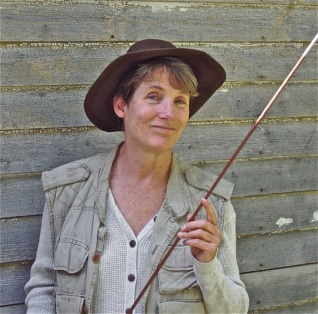The Art of the Dramatic Monologue

Gage as 'Fly Rod' Crosby
Ah, the dramatic monologue . . . “To be or not to be.” Sometimes referred to as “arias without music,” these speeches are often the high points of a play. They can also form the basis for entire scenes or even one-person shows. The dramatic monologue can be a marvel of manipulation, a surprisingly chaotic glimpse behind the mask of calm, a hilarious exhibition of vanity and self-delusion, a heartbreakingly honest revelation of human grief, or any of a thousand other facets of human nature. The dramatic monologue can be taken from everyday life, from the pages of history, or from the realms of pure imagination. It can deal with the trivia of daily routine, or the epic sweep of momentous social change, or ― best of all ― both at the same time!
The ability to construct the dramatic monologue is a useful tool for a writer in any genre, because the revelation of character through their own words allows the reader a direct, immediate, and powerful interaction with the character. This is a workshop for writers of journals, poetry, novels, short stories, and, of course, playwrights.
In this workshop, participants will hear samples of monologues performed by Gage, who tours internationally in her own work and who has authored a book on monologues. After a discussion of the elements of the monologue, including costume and staging, participants will compose their own monologues. These will be “performed” in staged readings and then polished for final presentation.
“Ms. Gage’s visit to Washington College was inspiring. Her passion for what she does is so obvious and her intellect so impressive that students and faculty alike were immediately and permanently engaged by her presentation and presence. Washington College is, in part, known for it’s writing program. We have regular visits by well known writers—everyone from Edward Albee and Israel Horovitz to Toni Morrison and John Barth in recent years. I can honestly say I have never seen students so enthusiastic about a guest. Another thing that is unusual and impressive is that she has kept in touch with several of our students since her visit. One of the things I was most impressed with was the clarity of her aesthetics and politics. This is a person who does not apologize for her agenda or the militancy necessary to further that agenda. The amazing thing is she combines that unswerving commitment with compassion, understanding, warmth, and generosity. She is totally committed to her art in a way that is truly inspiring. Don’t let the lesbian/feminist moniker scare you, this is a formidable artist in every way.” —Dale Daigle, PhD., Theatre Department Chair, Washington College, Chesterton, MD.
The ability to construct the dramatic monologue is a useful tool for a writer in any genre, because the revelation of character through their own words allows the reader a direct, immediate, and powerful interaction with the character. This is a workshop for writers of journals, poetry, novels, short stories, and, of course, playwrights.
In this workshop, participants will hear samples of monologues performed by Gage, who tours internationally in her own work and who has authored a book on monologues. After a discussion of the elements of the monologue, including costume and staging, participants will compose their own monologues. These will be “performed” in staged readings and then polished for final presentation.
- Maine Association of Community Theatres Conference, Auburn.
- University of Southern Mississippi, Hattiesburg, MS.
“Ms. Gage’s visit to Washington College was inspiring. Her passion for what she does is so obvious and her intellect so impressive that students and faculty alike were immediately and permanently engaged by her presentation and presence. Washington College is, in part, known for it’s writing program. We have regular visits by well known writers—everyone from Edward Albee and Israel Horovitz to Toni Morrison and John Barth in recent years. I can honestly say I have never seen students so enthusiastic about a guest. Another thing that is unusual and impressive is that she has kept in touch with several of our students since her visit. One of the things I was most impressed with was the clarity of her aesthetics and politics. This is a person who does not apologize for her agenda or the militancy necessary to further that agenda. The amazing thing is she combines that unswerving commitment with compassion, understanding, warmth, and generosity. She is totally committed to her art in a way that is truly inspiring. Don’t let the lesbian/feminist moniker scare you, this is a formidable artist in every way.” —Dale Daigle, PhD., Theatre Department Chair, Washington College, Chesterton, MD.
